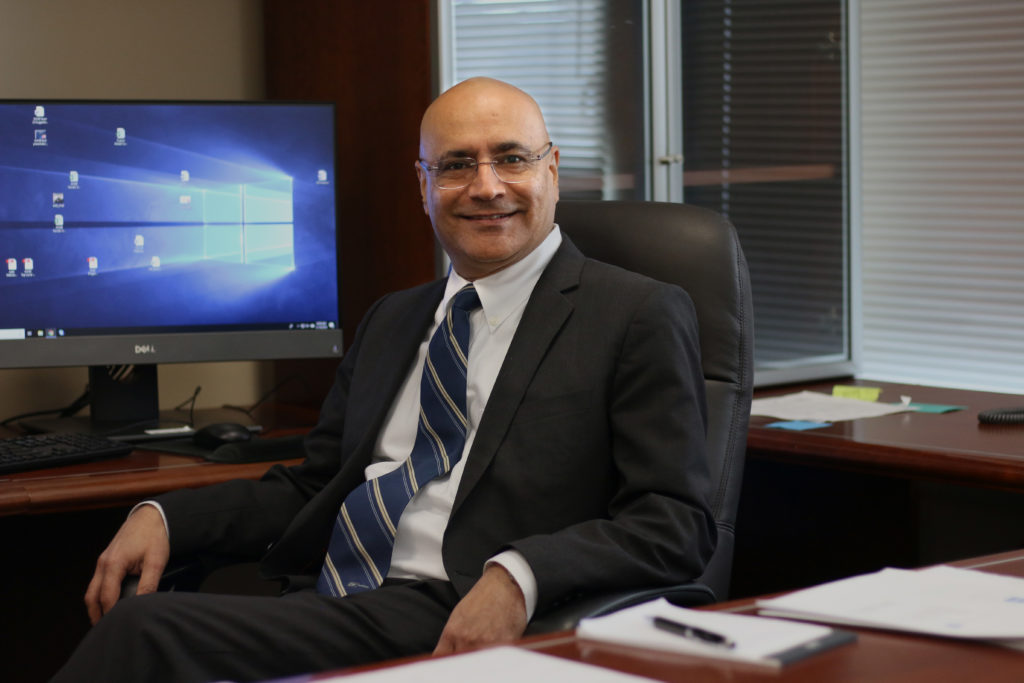Updated: April 22, 2019 at 7:04 p.m.
Like clockwork, School of Business Dean Anuj Mehrotra issues a letter to the community each month detailing the school’s current initiatives and plans for the future.
Often, the letters – without meaning to – highlight the fledgling dean’s own accomplishments. Since officials hired Mehrotra a year ago, business school officials have expanded online certificate programs, launched a new business minor, enhanced a workforce mentorship program and engaged students and alumni through a new event series – all while facing a budget deficit.
“The entire GWSB community – faculty, administrators, staff, students and alumni – have compiled an impressive record of accomplishment during the 2018-19 academic year,” Mehrotra said in an email. “In all of these efforts and initiatives, I am proud to say, that we have been guided by the principle of always putting students’ interests first.”
Mehrotra said that coming into the position, he did not view the business school’s problems as “challenges” but rather as “opportunities” that he and his team have “made the most of.” He added that the support and assistance of “all GWSB stakeholders” were key to his success.
Building a community
Mehrotra said the business school is a “family,” and he has worked to improve communication and community by holding town halls and meetings with students, faculty and staff.
“I have made it a priority to involve faculty and staff in all processes and to recognize their invaluable contributions to the school,” Mehrotra said.
Business school faculty said Mehrotra’s leadership has ushered in a new culture of transparency in the school.
James Bailey, a professor of leadership and management, said Mehrotra has made himself accessible to faculty and made an effort to meet with every professor in the school since he became dean.
“He’s approachable and open-minded,” Bailey said. “You can talk to him about anything and even if it’s something he disagrees with, he will hear you out, talk about it, listen to it and respond to it.”
Bailey added that Mehrohtra has a supportive personality and encourages faculty feedback.
“A lot of people have energy, and it almost irritates you, but his energy actually affects you in a good way,” he said. “I mean, you just feel positive when you’re around him.”
Creating flexible academic programs
With Mehrotra in charge, business school officials have launched or revamped several of the school’s academic programs.
Over the past year, administrators have debuted a business minor for non-business students, expanded class offerings during evenings and weekends and have promoted 4+1 programs, which allow undergraduate students to double-count nine credits from their bachelor’s to their master’s degrees, Mehrotra said.
Mehrotra has also spearheaded the digitization of graduate certificate programs, 12 credit-hour programs designed to give working professionals the chance to learn new skills. Business school officials launched the certificate programs before Mehrotra’s tenure, but the dean announced in February that at least a dozen programs will be offered online by fall 2020.
He added that the certificates are also now “stackable” – graduate students are able to combine two certificates with the 12 core classes in the Master of Business Administration program to earn a full MBA.
“We made significant, positive changes at the school, reimagining our suite of graduate programs to provide students with the education they need, in a format and timeline of their choosing,” Mehrotra said.
Homayoun Khamooshi, an associate professor of decision sciences, said offering students a flexible option that allows them to obtain a master’s degree in three installations makes the business school more attractive to prospective students.
“You get to pay one-third of the tuition, you come in with the same qualifications and requirements, everything is the same,” Khamooshi said. “If you like it and you have the money, you can continue and finish your master’s degree.”
Career opportunities and alumni engagement
In the past year, business school administrators have hired a consultant to help international students land a job after graduating and recruited a new executive director of the F. David Fowler Career Center.
Mehrotra said he is in the process of developing a “comprehensive plan for student success” in career management. The plan will include an expansion of student mentorship programs, like the Real Estate and Finance Alliance Mentorship Program and the Mentoring and Immersion Program for Consulting, a two-year consulting experience for undergraduate business school students, he said.
Mehrotra added that in the past year, the school has taken steps to keep alumni engaged with the business school. He said he has traveled across the globe to hold events to keep alumni “informed and involved with what is happening at GWSB” and to encourage them to contribute to scholarship and financial aid funds.
“It has been most gratifying to learn of their commitment to staying engaged with GWSB,” Mehrotra said.
Mehrotra said he was “very proud” of the business school’s new “George Talks Business” event series, which brings business school alumni and industry leaders to the school to share their insights.
Pradeep Rau, a professor of marketing, said Mehrotra has tackled many of the business school’s issues with new programs since stepping in as dean.
“He has a number of new curricular and other initiatives which have been recently initiated,” Rau said. “Hopefully these initiatives will be successful, but it is a little early to tell.”
Meredith Roaten contributed reporting.
This post was updated to reflect the following correction:
The Hatchet incorrectly reported that students could combine three graduate certificates to earn a full Masters in Business Administration. Students are able to combine two certificates with the 12 core MBA classes to earn a full MBA. We regret this error.





